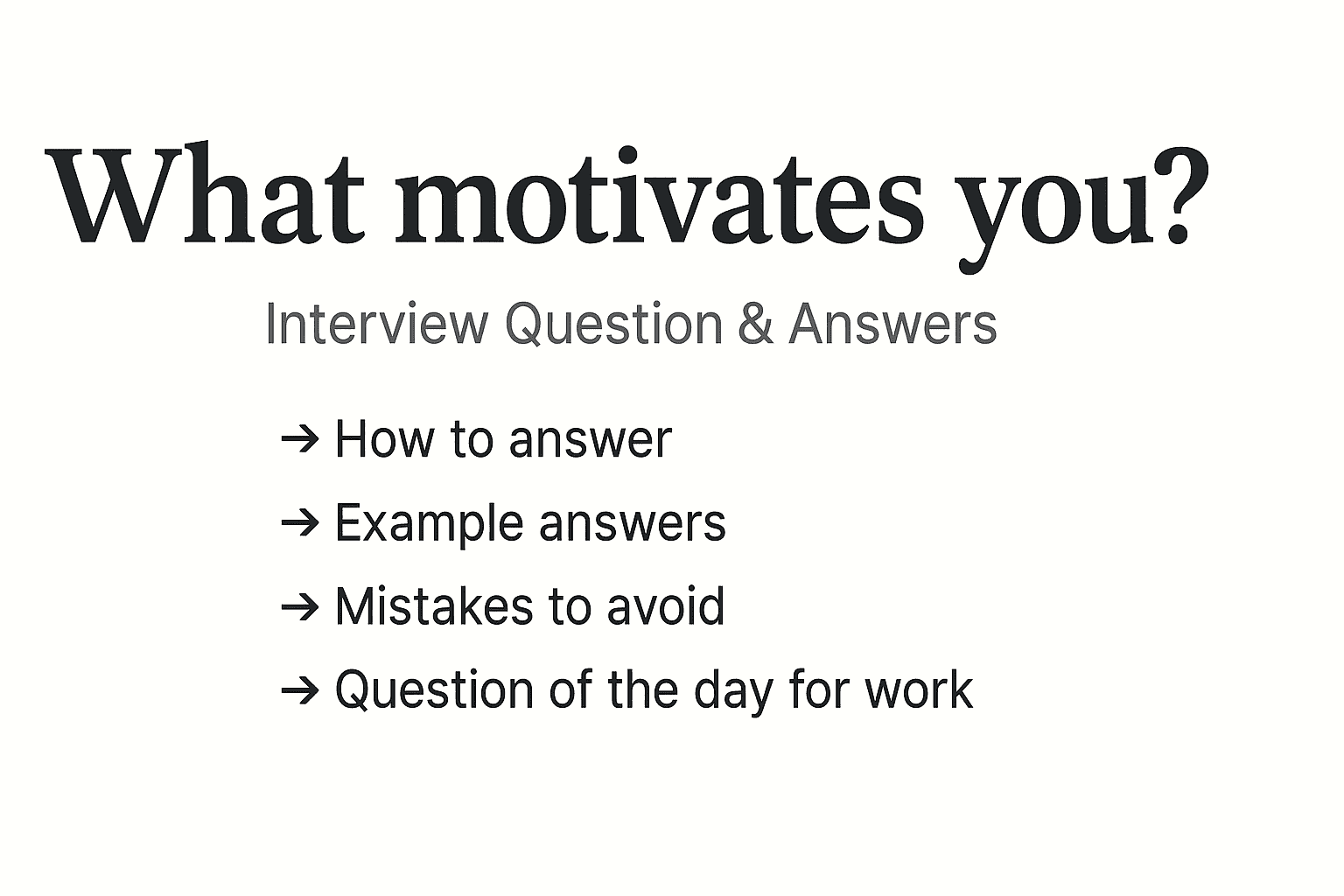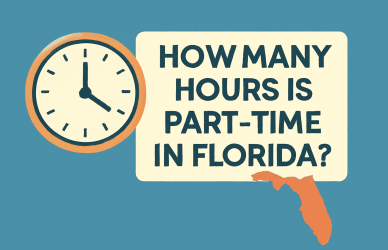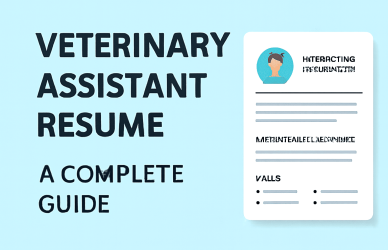What Motivates You Interview Question: How to Answer and Use It as a Question of the Day for Work
If you have ever faced the classic “What motivates you?” interview question or used it as a question of the day for work to inspire your team, you already know how powerful this question can be.
It reveals not only what makes you professionally qualified but also how well your values and energy align with a company or team.
It reveals not only what makes you professionally qualified but also how well your values and energy align with a company or team.
In this guide, you will learn how to answer the “What motivates you” interview question, discover strong interview questions and answers about what motivates you, and explore how this concept can improve team motivation in the workplace.
Why Employers Ask “What Motivates You”
Interviewers ask this question to learn more than what appears on your resume. They want to understand three key things:
- Alignment with the role and company culture
Your motivators tell them if you will enjoy the actual work and environment. - Consistency and engagement
People who work for reasons that align with their roles tend to perform better and stay longer. - Self-awareness
A thoughtful answer shows maturity and emotional intelligence.
How to Answer the Interview Question “What Motivates You”
The right answer combines authenticity, relevance, and storytelling. Here is a simple structure to follow for success.
1. Reflect on What Truly Motivates You
Think about moments in your career or studies when you felt most energized.
Ask yourself:
Ask yourself:
- What kind of projects make me feel fulfilled?
- When do I feel proud of my work?
- What achievements gave me genuine satisfaction?
Common motivators include learning new skills, achieving results, helping others, teamwork, or making an impact.
2. Match Your Motivation to the Role
Once you identify your motivators, connect them to the job you are interviewing for.
If the position values innovation, talk about how you are motivated by creativity and problem-solving.
If the company highlights teamwork, mention that collaboration drives you.
If the position values innovation, talk about how you are motivated by creativity and problem-solving.
If the company highlights teamwork, mention that collaboration drives you.
3. Use the STAR Framework
Use a short story to show your motivation in action.
Structure it like this:
Structure it like this:
- Situation: Describe the background.
- Task: Explain the goal or challenge.
- Action: What you did to address it.
- Result: Share the outcome or success.
Finish by linking it to your motivation. For example:
“That experience reminded me how motivated I am by setting clear goals and achieving measurable progress.”
“That experience reminded me how motivated I am by setting clear goals and achieving measurable progress.”
4. Be Honest but Professional
Avoid pretending to be someone you are not. If recognition motivates you, say so but connect it to doing great work.
For example:
“I feel most motivated when my effort helps the team achieve its goals and my contribution is recognized.”
For example:
“I feel most motivated when my effort helps the team achieve its goals and my contribution is recognized.”
5. Keep It Focused
Select one or two motivators and craft a concise, confident response. Avoid long, generic explanations.
Examples of What Motivates You Interview Question Answers
Here are several what motivates you interview question answer examples for inspiration.
Achievement and Results | “In my last position, I was given an ambitious quarterly goal. I broke it into smaller milestones and stayed focused until I exceeded the target by 15 percent. That experience confirmed that measurable progress motivates me.” | Sales, Marketing, Operations |
Growth and Learning | “I am always motivated by learning new things. When our company adopted a new system, I volunteered to train others. The process of learning and teaching energized me. I am excited to continue growing in this role.” | Technology, Education, Startups |
Purpose and Impact | “What drives me most is knowing that my work makes a difference. Helping clients solve complex problems gives me purpose and keeps me motivated.” | Healthcare, Social Work, Customer Success |
Teamwork and Collaboration | “I enjoy being part of a strong team where ideas are shared and goals are achieved together. Working with others and celebrating success as a group is what motivates me most.” | Human Resources, Project Management, Administration |
Each of these examples employs a clear narrative and directly links motivation to job success.
Common Mistakes to Avoid
| Use real examples | Giving vague answers like “I like challenges” |
| Align motivation with the company’s values | Talking about motivations that conflict with the role |
| Be concise and clear | Rambling or repeating the same idea |
| Stay authentic | Saying what you think they want to hear |
| Show enthusiasm | Sounding flat or uninterested |
A strong interview question what motivates you answer always feels personal and confident rather than memorized.
Using “What Motivates You” as a Question of the Day for Work
You can also turn this powerful interview question into a daily or weekly question of the day for work to engage your team.
Why It Works
- Encourages open communication and trust
- Helps leaders understand what energizes each team member
- Builds a positive and supportive culture
- Promotes reflection and goal alignment
Examples of Team Prompts
- What motivates you to do your best work?
- What inspired you most this week?
- What task gave you the most energy today?
- When do you feel proud of what you do?
Using these prompts in meetings or chats can improve connection and morale across the team.
Expert Tips and Insights
- Recruiters often remember candidates who connect motivation to tangible impact.
- Use specific outcomes or metrics to make your story credible.
- Tailor your motivators to the role and company values.
- Prepare two short examples so you can adapt easily in different interviews.
These tips add authenticity and show you have real-world experience and awareness.
FAQs:
What motivates you interview question and answer for freshers
Fresh graduates can discuss moments from projects, volunteering, or studies that gave them a sense of energy.
For example: “Completing group assignments successfully and seeing my teammates achieve their goals motivated me to keep improving.”
For example: “Completing group assignments successfully and seeing my teammates achieve their goals motivated me to keep improving.”
How to answer “What motivates you” when changing careers
Focus on motivations that apply across industries, such as learning, problem solving, and personal growth.
Example: “Transitioning to this field excites me because I am motivated by mastering new skills and creating value in new ways.”
Example: “Transitioning to this field excites me because I am motivated by mastering new skills and creating value in new ways.”
What are bad answers to “What motivates you”
Avoid self-centered or vague statements like “I just need a job” or “I like money.”
If money is part of your motivation, reframe it as “I value being rewarded for strong performance.”
If money is part of your motivation, reframe it as “I value being rewarded for strong performance.”
Why do employers ask about motivation?
They want to understand your attitude, values, and whether you will stay engaged over the long term.
Conclusion
Answering the what motivates you interview question effectively is about knowing yourself and aligning your motivation with the opportunity in front of you.
When your answer is authentic, specific, and connected to the company’s mission, you stand out as a confident and self-aware professional.
When your answer is authentic, specific, and connected to the company’s mission, you stand out as a confident and self-aware professional.
The same concept can strengthen your team when used as a question of the day for work.






